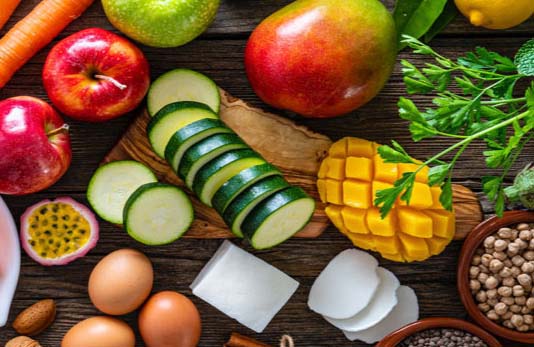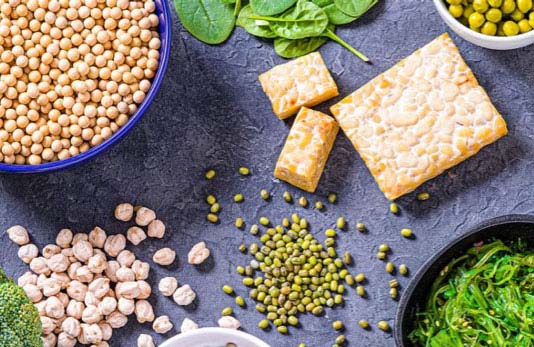Vegetarian? How to keep your teeth healthy

Whether you're vegetarian because of ethical concerns, religious practice or health reasons, it's worth considering your dental health. A vegetarian diet can potentially improve overall wellness, but it's important to balance your meals carefully. By eliminating certain food groups, you can potentially miss out on key nutrients for teeth and gums.
What is a vegetarian diet?
A vegetarian is someone who abstains from eating meat. Definitions vary when it comes to who counts as a vegetarian, but there are typically three main groups:
- Pescatarians eat seafood but avoid other animal products, including poultry.
- Lacto-ovo vegetarians avoid animal products, such as meat and seafood, but do eat animal byproducts, such as milk, eggs and honey.
- Vegans, also known as strict vegetarians, avoid all animal products and byproducts, including dairy, eggs and honey. In addition to their diet, some vegans may also avoid using animal products for other purposes, such as wearing leather shoes.
At least five in every 100 Americans are vegetarian, and three in 100 are vegan, according to a Gallup poll in 2018.
How does a vegetarian diet affect dental health?
Is a vegetarian good for teeth or bad for teeth? It really depends on what you eat.
Not all vegetarian diets are alike. Compare a lentil salad, with fresh cucumbers and bell peppers, to a meal of French fries and meatless nuggets. Both are vegetarian, but the salad contains key vitamins and fiber, while the fast food option is high in cholesterol and cavity-causing starch. Similarly, a non-vegetarian diet isn't necessarily balanced, depending on what foods it includes.
How a vegetarian diet can improve dental health
Features of a healthy vegetarian diet can include the following:
- High in vitamin-rich vegetables. By cutting meat out of their diets, many vegetarians opt for more vegetables. Not only are vegetables a good source of fiber (which can help rinse away plaque), they also contain essential vitamins and minerals for oral health. For example, leafy greens are packed with vitamin C for healthy gums, and sweet potatoes and carrots contain vitamin A, which can boost immune response, helping your mouth heal quickly.
- No high-cholesterol animal products. When you eliminate animal products, you also cut out a key contributor to heart disease and high blood pressure. It's no surprise, then, that a vegetarian diet is associated with a lower risk of death from heart disease, lower blood pressure and lower rates of hypertension, according to the American Dietetic Association.
How a vegetarian diet can harm dental health
When not planned with health in mind, a vegetarian diet can also come with some specific risks.
- Increased dental erosion. Erosion, or wear on the teeth, can be more common among vegetarians, according to meta-analyses of the research. How come? Vegetarians and vegans may be more likely to consume acidic foods, such as fruits, and starchy foods, which can contribute to decay.
- Lack of key nutrients. Any dietary restrictions can increase your chances of missing out on important building blocks of nutrition. Common nutritional deficiencies among vegetarians and vegans include vitamins B12 and D. These vitamins are found primarily in animal-based products but can also be sourced from plant-based alternatives. Calcium and protein can also be lacking.
- High in carbs. Like dining on French fries and meatless nuggets, you may fall back on carbohydrates to help you feel full. Carbohydrate-rich foods, such as bread, pasta and potatoes, are usually plant-based, which makes them an easy choice on a vegetarian or vegan diet. This type of unbalanced meal can promote cavities and spike blood sugar.
Essential vitamins and nutrients for vegetarians
To avoid deficiencies in your diet, make sure to incorporate these key nutrients.
Calcium
What it does: The most abundant mineral in the human body, calcium is essential for healthy teeth. Found abundantly in dairy products, salmon and sardines, it keeps your enamel strong and extends the life of your teeth.
Why vegetarians are at risk: By not eating seafood or dairy products, vegans are at particular risk for calcium deficiency.
How to find it: Plant-based sources of calcium include leafy green vegetables, such as collard greens, kale and spinach, as well as soybeans, tofu and almonds.
Protein
What it does: Protein strengthens your jawbone and helps your salivary glands function properly. When you're deficient, you may be at higher risk for tooth decay and bone loss. Adult women should eat about 5 ounces of protein a day, while adult men should eat between 5.5 and 6 ounces, according to the U.S. Department of Agriculture.
Why vegetarians are at risk: Since meat is a top source of protein, vegetarians typically consume less protein than non-vegetarians. However, this essential nutrient can be easily found in a plant-based diet.
How to find it: Seek out protein-rich plants and grains, such as beans, soy, nuts, seeds, quinoa and buckwheat.
Vitamin B12
What it does: This vitamin is a key building block of cells. Without it, you're at risk for mouth sores and gum disease.
Why vegetarians are at risk: Vitamin B12 is found primarily in animal products and byproducts, including meats, dairy and eggs.
How to find it: Lacto-ovo vegetarians can boost their intake with eggs, milk and cheese, while vegans may need to eat nutritional yeast, dried seaweed or shiitake mushrooms to ensure sufficient vitamin B12.
Vitamin D
What it does: Vitamin D helps your body absorb calcium and is essential to your immune system. A vitamin D deficiency can put you at risk for gum disease, bone loss and tooth decay.
Why vegetarians are at risk: Fatty fish, liver and egg yolks are rich sources of vitamin D, so vegetarians and vegans may be more likely to be deficient.
How to find it: You can produce vitamin D naturally by spending time outdoors with direct exposure to sunlight, especially during summer months or the middle of the day. Dietary sources include mushrooms and eggs, as well as fortified milks, juices and cereals. You can also take daily vitamin supplements.
How to protect your dental health as a vegetarian
To enjoy the advantages of a vegetarian diet, make smart choices for your teeth and body.
- Load up on fresh vegetables. Incorporate veggies into your meals, and potatoes don't count! Opt for leafy greens (rich in fiber and vitamins A, C and K) as well as brightly colored veggies like carrots, sweet potatoes and pumpkin (full of vitamin C).
- Cook from scratch. Avoid fake meats, including vegetarian alternatives to deli meats. These products are often high in sodium and sugar. They may also contain processed oils. Instead, base meals on healthy ingredients, like veggies and legumes. For example, swap out that veggie burger and bun for a bean soup with carrots and celery.
- Watch out for starchy carbohydrates. Carbohydrates can be an easy way to replace animal products, but simple carbs can spike your blood sugar and feed plaque-causing bacteria. Avoid relying on foods like bread, pasta, pizza and potatoes to fill up. Make sure to balance carbohydrates with other types of foods, such as proteins and fats.
- Opt for whole grains. Not all carbohydrates are created equal! When selecting carbs, choose whole grain over white. Think brown rice, whole grain pasta and whole wheat bread. These alternatives have have a lower glycemic index, which means they're digested more slowly than refined grains and don't affect blood sugar as dramatically. They're also less likely to produce cavities.
- Cut back on sugar. Limiting your sugar intake is an important step in protecting your health, whether you're vegan, vegetarian or an omnivore. Sugar is a primary cause of tooth decay. To lower your risk while still satisfying your sweet tooth, opt for fresh fruits over candies and desserts, and reduce the amount of sugar you add to foods and drinks.
By eating right and following these steps, you can maintain a vegetarian diet and keep your teeth healthy.
A balanced diet is key for everyone
Whether pescatarian or vegan, omnivore or vegetarian, a balanced diet is essential to your dental and overall health
A healthy diet and good oral health care habits are the best defense against problems with gums and teeth. Eating a balanced variety of fruits, vegetables, grains, and legumes will help vegetarians — and anyone — achieve a healthy, well-rounded diet and a healthy smile.

Last updated December 20, 2022
Related articles:
The oral health information on this website is intended for educational purposes only. Always consult a licensed dentist or other qualified health care professional for any questions concerning your oral health.


